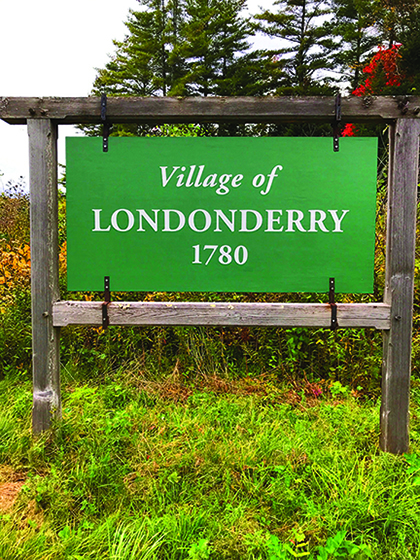LONDONDERRY, Vt.— At Londonderry’s 2024 Town Meeting, voters approved the general fund budget of $2,747,516, passed several appropriation funds, approved a 1% local option tax on meals and alcoholic beverages, turned down a 1% local option tax on sales, approved a fourth full-time highway department position, and approved the hiring of a part-time short-term rental (STR) administrator. The initial $50,000 spent on the latter decision will be offset by STR registration fees.

After the Town Officers Report was passed without discussion, voters reelected James Fleming for a two-year selectboard seat, reelected incumbent Selectboard Chair Thomas Cavanagh for a term of three years, elected Alex Alberti to be a lister for a three-year term, elected Chris Blackey as cemetery commissioner for a five-year term, and reelected Pauline Davidson as trustee of public funds for a term of three years.
New resident Barry Randall raised several concerns over the proposed budget, later echoed by other voter questions. First, he said that, because the selectboard changed the budget again shortly before Town Meeting, they had not given voters like himself an adequate amount of time to reread and reanalyze the new budget. Next, he noted that this year’s budget would represent a significant increase from the budget last year. He said this would mean nearly $2.5 million would have to be raised through taxes, including all of the proposed appropriated funds, but not the expected dramatic increase in education taxes or the proposed 1% local option taxes on meals, alcoholic beverages, and sales. Randall reminded voters that these factors would lead to significant tax increases this year, and possibly next year as well.
In response, town treasurer Tina LaBeau said the only changes to the budget were some numbers she had forgotten to add to her spreadsheet, specifically the amount of funds going towards the new fire truck for Phoenix Fire Company #6. She also stressed that appropriated and reserve funds are there for specific purposes, and that their establishment and use are decided by the voters of Londonderry. Other concerned citizens raised similar questions about tax rate increases. LaBeau said that, as with all other Vermont towns, Londonderry won’t have an official number until the town grand list and the state common level of appraisal (CLA) are released, but she does not expect Londonderry’s tax rate to rise by as much as 20% as some have feared. Sandra Clark added that she and the other town listers are hard at work on the grand list.
In between articles, town clerk Kelly Pajala addressed voters on the state education funding controversy. She explained how the new pupil weighting system had led many school districts to believe that they could raise budgets significantly with low tax burdens, leading to increased education spending across the state. She described Londonderry as a “gold town” in regards to education spending, saying that, “We have always sent more money to the state of Vermont than it takes to educate our local students.” She acknowledged that property tax projections are “extremely scary,” but for Londonderry, she can say that, “at the very least, the scariest numbers that everyone is hearing right now shouldn’t come to fruition.”
Eleven of the meeting’s 21 articles were appropriation funds for several local community organizations, public services, and town projects. None were as lengthily debated as the $50,000 to go towards the salary and expenses of the new STR administrator position. Many citizens were concerned that the selectboard had not properly prepared the registration fee structure to cover the $50,000 that will go towards the salary and expenses of the part-time position. Chair Cavanagh explained that the selectboard had agreed at a special meeting the night before that the town would levy a $140 fee for hosted STRs (properties where the owner or a caretaker lives on site) and a $500 fee for unhosted STRs (properties where the owner or caretaker does not live on site). This was based on last year’s Londonderry Housing Study, which estimated there to be 140 STRs total in town – a figure selectboard member Melissa Brown and several other residents called a conservative estimate. The selectboard explained that, no matter how much or how little money was raised through fees and fines, they would only be able to use those funds to cover the salary and expenses of the position. As the State of Vermont does not recognize STRs as a business, the town is not allowed to make revenue from any excess, and as a condition of the position, any shortage in those funds would result in the STR administrator’s hours being limited rather than the loss of taxpayer funds.
A few citizens believed the selectboard’s calculations were not concrete enough to warrant action, and moved for the article to be tabled until the selectboard had a special meeting on the issue, which moderator Doug Friant warned would essentially kill the article. Brown called for immediate action to help address Londonderry’s housing crisis, and she and town administrator Shane O’Keefe defended the selectboard’s research. After considerable roundabout discussion, the question was called and the article passed.
Articles 19 and 20 proposed the introduction of 1% local option taxes on meals and alcoholic beverages, and sales, respectively, which the selectboard hoped would ultimately save homeowners from some of this year’s expected exorbitant tax rates. While the meals and alcoholic beverages tax passed relatively quickly after some discussion, many residents spoke out against the introduction of an additional sales tax. Chief among their concerns was that shopping in Londonderry is already expensive enough to make many citizens buy their goods in other area towns, and as the tax would have applied to online shopping as well, many wondered if the selectboard had done adequate research on what the effects on that would be. After a long discussion period, the article failed.